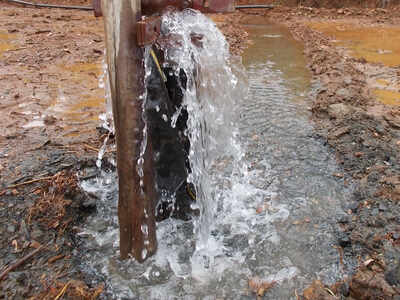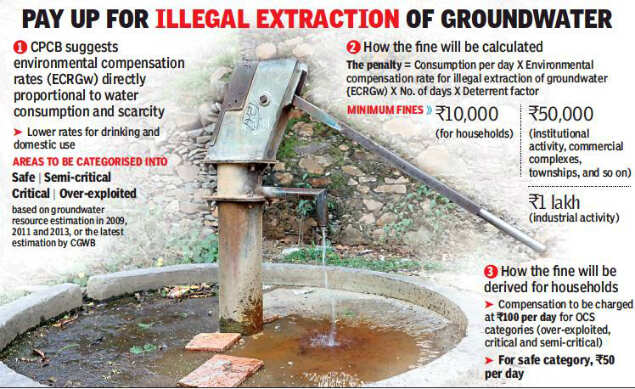
NEW DELHI: To stop illegal extraction of groundwater, a panel of the Central Pollution Control Board has suggested environmental compensation (EC) ranging from Rs 10,000 to Rs 1,00,000, especially in Delhi and the National Capital Region. The panel says in the report submitted to the National Green Tribunal, “Considering water as a basic human need, environmental compensation charges in case of domestic or household uses may be kept low and higher rates prescribed for institutional, commercial, infrastructural and industrial purposes by the extraction of ground water.”

For drinking or domestic purposes, the minimum EC suggested is Rs 10,000 for households and Rs 50,000 for institutional activity, commercial complexes, townships, etc. For industrial activity, the minimum rate suggested is Rs 1 lakh. Repeat violations should attract EC 1.25 times higher, the panel recommended.
“The falling water table is a matter of special concern since it tends to reduce the accessibility of the resource to small and marginal farmers due to increase in costs of extraction,” says the report titled ‘Assessment of Environmental Compensation in Case of Illegal Extraction of Ground Water’, submitted in compliance with NGT’s order of May 7 in the case filed by Delhi environmentalist Shailesh Singh on the illegal extraction of groundwater by industries in Noida and Greater Noida.
The panel recommended that the “violation duration” should be assumed as being at least one year in cases where no evidence of the date of borewell installation could be established. For industrial groundwater abstraction where a metering system is not available, water consumption should be estimated as per consent conditions imposed by the state pollution control board or the pollution control committee.
The panel also said that water in an over-exploited area should be permitted to be drawn out only for drinking, and industries established in such areas without prior consent or clearance of the Central Ground Water Authority or similar departments must be closed down immediately.
Activists, however, felt more needed to be done. For instance, Vikrant Tongad, founder member, Social Action for Forest & Environment, pointed out the absence of EC for the agriculture sector. Tongad, who has pursued the issue of groundwater in NGT with a number of petitions, said, “Almost 85% of the consumption of groundwater is by the agriculture sector. We are not saying that farmers should be burdened, but agriculture should also be covered, and a provision made for groundwater recharge penalties with EC.”
The panel report will be reviewed at the next hearing in NGT on July 19, after which there will be a decision on the possible implementation of these compensation charges.

For drinking or domestic purposes, the minimum EC suggested is Rs 10,000 for households and Rs 50,000 for institutional activity, commercial complexes, townships, etc. For industrial activity, the minimum rate suggested is Rs 1 lakh. Repeat violations should attract EC 1.25 times higher, the panel recommended.
“The falling water table is a matter of special concern since it tends to reduce the accessibility of the resource to small and marginal farmers due to increase in costs of extraction,” says the report titled ‘Assessment of Environmental Compensation in Case of Illegal Extraction of Ground Water’, submitted in compliance with NGT’s order of May 7 in the case filed by Delhi environmentalist Shailesh Singh on the illegal extraction of groundwater by industries in Noida and Greater Noida.
The panel recommended that the “violation duration” should be assumed as being at least one year in cases where no evidence of the date of borewell installation could be established. For industrial groundwater abstraction where a metering system is not available, water consumption should be estimated as per consent conditions imposed by the state pollution control board or the pollution control committee.
The panel also said that water in an over-exploited area should be permitted to be drawn out only for drinking, and industries established in such areas without prior consent or clearance of the Central Ground Water Authority or similar departments must be closed down immediately.
Activists, however, felt more needed to be done. For instance, Vikrant Tongad, founder member, Social Action for Forest & Environment, pointed out the absence of EC for the agriculture sector. Tongad, who has pursued the issue of groundwater in NGT with a number of petitions, said, “Almost 85% of the consumption of groundwater is by the agriculture sector. We are not saying that farmers should be burdened, but agriculture should also be covered, and a provision made for groundwater recharge penalties with EC.”
The panel report will be reviewed at the next hearing in NGT on July 19, after which there will be a decision on the possible implementation of these compensation charges.
World Cup 2019
Trending Topics
LATEST VIDEOS
City
 Kolkata's Muslim majority Khidirpur area celebrates Rath Yatra with great fervour
Kolkata's Muslim majority Khidirpur area celebrates Rath Yatra with great fervour  Mentally challenged woman mercilessly thrashed by locals in Karnataka's Shimoga
Mentally challenged woman mercilessly thrashed by locals in Karnataka's Shimoga  Congress MLA Nitesh Rane instigates mob to throw mud water on engineer, tie him up as 'punishment' for bad roads
Congress MLA Nitesh Rane instigates mob to throw mud water on engineer, tie him up as 'punishment' for bad roads  On cam: Goons threatening residents in Bengaluru
On cam: Goons threatening residents in Bengaluru
More from TOI
Navbharat Times
Featured Today in Travel
Quick Links
Lok Sabha Election Schedule 2019Lok Sabha Election NewsDelhi Capitals teamMI team 2019Rajasthan Royals 2019RCB team 2019Maharashtra Lok Sabha ConstituenciesBJP Candidate ListBJP List 2019 TamilnaduShiv Sena List 2019AP BJP List 2019Mamata BanerjeeBJP List 2019 MaharashtraPriyanka GandhiBJP List 2019 KarnatakaAMMK Candidate List 2019BJP List 2019 WBLok Sabha Elections in Tamil NaduBSP List 2019 UPNews in TamilLok Sabha Poll 2019Satta Matka 2018PM ModiMahagathbandhanNagpur BJP Candidate ListChandrababu NaiduTamil Nadu ElectionsUrmila MatondkarNews in TeluguMadras High CourtTejashwi YadavArvind KejriwalTejasvi SuryaPawan KalyanArvind KejriwalYogi AdityanathJaya PradaSatta King 2019Srinagar encounter
Get the app





